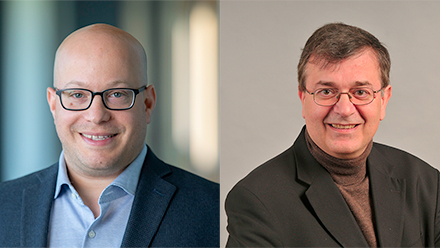Rivnay, Kanatzidis Named 2024 Researchers to Know
Annual list compiled by the Illinois Science & Technology Coalition spotlights state leaders in innovation
Northwestern Engineering’s Jonathan Rivnay and Mercouri Kanatzidis have been named on the Researchers to Know 2024 list by the Illinois Science & Technology Coalition (ISTC).
Rivnay, professor of biomedical engineering and materials science and engineering, was recognized for his work in biohybrid bioelectronic materials, and devices. Rivnay’s interests involve understanding the unique active properties of organic (small molecule and polymeric) materials, including mixed ionic-electronic conduction and actuation and utilizing their strengths for sensing/stimulation in biomedical settings. More recently his research combines engineered biological components like proteins, DNA, and living cells, with bioelectronics to realize new opportunities in health and medicine.
 Also honored was Kanatzidis, Charles E. and Emma H. Morrison Professor of Chemistry and (by courtesy) professor of materials science and engineering. He was cited for his work on new materials, exploratory synthesis, and energy conversion. He specializes in the design of new materials, exploratory synthesis, thermoelectric materials, nanostructured materials, intermetallics, and applications of the new materials to solar energy conversion, radiation detection, heat-to-electrical conversion, and nuclear and environmental remediation.
Also honored was Kanatzidis, Charles E. and Emma H. Morrison Professor of Chemistry and (by courtesy) professor of materials science and engineering. He was cited for his work on new materials, exploratory synthesis, and energy conversion. He specializes in the design of new materials, exploratory synthesis, thermoelectric materials, nanostructured materials, intermetallics, and applications of the new materials to solar energy conversion, radiation detection, heat-to-electrical conversion, and nuclear and environmental remediation.
Previously cited Northwestern Engineering researchers include Guillermo Ameer and Jian Cao (2022), Sossina Haile (2021), Vinayak Dravid (2020), Michael Jewett (2019), Jennie Rogers (2019), Joshua Leonard (2019), and Ed Colgate (2018).
The ISTC is a member-driven non-profit, nonpartisan organization that cultivates technology-based economic development throughout Illinois. Its annual Researchers to Know list provides a look at some of the researchers that are driving innovation in the state — from those advancing new treatments in medicine, to those revolutionizing sustainability practices and shaping new technologies in the 21st century.